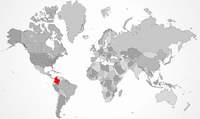Colombia shows sag in public finances before Bush's visit
When U.S. President George W. Bush arrives in Colombia on Sunday he is likely to praise the economic model of President Alvaro Uribe, his staunchest ally in a region increasingly dominated by anti-American leaders.

But some of the praise may be undeserved considering new economic data pointing to a sag in public finances in Colombia, the beneficiary of US$700 million (EUR 532 million) in annual U.S. aid.
Colombia's position as Washington's star economic pupil has irked some leaders in the region who do not get the same kind of praise in countries that boast relatively healthy finances.
While some of the region's former economic basket cases, including Argentina and Peru, posted budget surpluses last year, Colombia's central bank said it had missed its 2006 fiscal-deficit target by a wide margin.
Despite record gross domestic product growth of an estimated 7 percent, public spending exceeded its income by 0.9 percent of GDP - more than double the government's revised target, made in December, of 0.4 percent.
"With the economy going so strong, and still the central government is posting such a huge deficit, you have to wonder what happens when growth cools," said Fernando Losada, director of emerging markets research at ABN Amro in New York.
The White House is forecasting a U.S. budget deficit of 1.8 percent of GDP this year, down from 1.9 percent in 2006, albeit in an economy more developed and creditworthy than Colombia's.
Colombia's results were particularly worrisome to investors because the country is one of the few in commodity-rich Latin America to experience an erosion of its fiscal accounts - in 2005 the public sector posted a balanced budget - and a widening of its trade deficit.
Oscar Zuluaga, who was sworn in as Colombia's finance minister Thursday in replacement of the retiring Alberto Carrasquilla, downplayed the reversal, saying the trade and productivity benefits from a huge infrastructure development program have yet to be felt.
"The big challenge is to maintain the strong inflow of capital, achieve annual growth rates of a minimum 5 percent, and gradually reduce the deficit even further," Zuluaga said at a news conference.
New York-based debt rating agency Standard & Poor's on Monday upgraded the country's long-term foreign debt to one notch below investment grade, citing an Asian Tiger-like investment and privatization windfall. Colombia's overall debt-to-GDP burden, at 31 percent, is among the region's lowest and falling fast, S&P said.
S&P said the large public pension system remains underfunded, however, and Zuluaga predicted similar deficit levels for 2007.
By expanding the military to go after the country's five-decade old leftist insurgency, Uribe is credited with bringing down kidnapping and murder rates that are among the world's highest. That'syielded an unprecedented economic dividend, evidenced by the start of businesses by wealthy Colombians who moved abroad during the height of the country's drug-fueled violence last decade and who are now returning in droves.
Colombia is the world's largest producer of cocaine, though its contribution to the economy is believed to be relatively small.
But some analysts say Uribe has failed to position Colombia's economy for long-term economic stability.
Although Colombia is the only South American country with ports on both the Pacific and Atlantic oceans, it has so far failed to follow the consensus strategy of Latin heavyweights Brazil and Argentina and aggressively court economic ties with China. Unlike Chile, Mexico and Peru, Colombia is not a member of the Asian-Pacific Economic Cooperation trade group.
"Uribe's reputation as a tough-talking politician doesn't square up with his economic performance," said Walter Molano, research director at Connecticut-based BCP Securities, LLC. "His ability to consolidate the security gains into lasting economic reforms and allow Colombia to benefit from the commodity boom has been zero."
Uribe has defied growing resentment here and throughout the region against Washington and aggressively pursued a bilateral free trade pact with the United States, on which he depends for anti-narcotics and counterinsurgency aid.
After being signed by Bush in November, the trade deal is now stalled in Congress due to Democrat concerns over Colombia's human rights record and the government's ties to right-wing paramilitary groups.
Attending Uribe's inauguration last August to a second four-year term, Treasury Secretary Henry Paulson praised the president for strengthening Colombia's public finances and for embarking on a "historic journey" to economic freedom.
But a look at the rest of Latin America seems to indicate Colombia's performance is less than stellar, the AP reports.
Since Argentina's gargantuan collapse in 2001, the government of President Nestor Kirchner has exported his country out of the red with an active monetary policy. Although the policy was widely criticized by foreign investors as overly interventionist, Argentina has enjoyed 48 months of uninterrupted growth, record exports and has repaid ahead of time its US$9 billion (EUR 6.8 billion) debt to the International Monetary Fund.
But like Venezuelan President Hugo Chavez, who is bankrolling a deficit of his own thanks to huge oil exports, Kirchner is struggling to keep double-digit inflation in check. Economists have expressed concerns that lavish spending by both leaders and moves to assert state control is dissuading investment.
"Colombia's fiscal dynamics are manageable, but they're not worth jumping for joy over," said Alberto Ramos, senior economist at the research group for Goldman Sachs in New York.
Subscribe to Pravda.Ru Telegram channel, Facebook, RSS!


